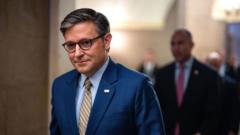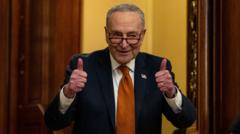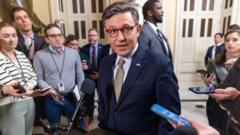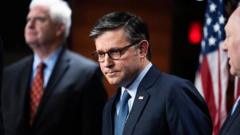Tensions rise among U.S. lawmakers as a crucial bipartisan funding bill is threatened by strong opposition from former President Donald Trump and tech entrepreneur Elon Musk, leaving Congress with limited time to prevent a government shutdown.
Looming Government Shutdown Sparks Debate Among U.S. Lawmakers

Looming Government Shutdown Sparks Debate Among U.S. Lawmakers
The U.S. Congress faces a possible shutdown as bipartisan funding measures are derailed by Trump and Musk's criticisms.
Speaker of the House Mike Johnson's bipartisan funding bill, encompassing 1,500 pages, is currently under significant scrutiny, potentially leading to a government shutdown that could initiate as soon as midnight Saturday. This situation has unfolded following recent public condemnation from President-elect Donald Trump, who has called on Republican lawmakers to abandon the existing bipartisan agreement in favor of a more streamlined funding approach. His stance is echoed by tech billionaire Elon Musk, who has publicly criticized the bill on various platforms.
Republican House Majority Leader Steve Scalise hinted on Wednesday night that the bipartisan funding deal was effectively dead due to Trump's denunciation. Congress is under pressure to pass this short-term funding legislation before the end of the week, or risk a federal operations shutdown impacting services like the National Park Service and Border Patrol from this weekend onward.
Both Trump and Vice-President-elect JD Vance have heavily criticized the original funding proposal advocated by Speaker Johnson, influenced by Musk's active lobbying against it. Musk, who is expected to play a role in future governmental fiscal policies under Trump’s potential administration, took to social media to voice objections, including misinformation about the bill’s provisions. The rejected bipartisan agreement aimed to extend government funding until March 14, long after Trump is anticipated to reclaim the presidency.
As it stands, Congress has not yet passed a budget for the 2025 fiscal year, initiating a reliance on temporary funding extensions. A previous agreement provided funding through December 20, yet lawmakers are now urged to raise the debt ceiling, alongside calls for tighter spending practices devoid of what are viewed as "Democrat giveaways."
The agreement crafted by Johnson consisted of critical allocations, including $110 billion for emergency disaster relief, $30 billion in assistance for farmers, and various legislative reforms pertinent to infrastructure and public services. However, with significant bipartisan collaboration now fracturing, Johnson’s next moves remain uncertain.
Following Trump's remarks, criticism from Democratic leaders has intensified, stating that Republicans can no longer participate in bipartisan legislation without facing consequences. They emphasize that the failure to maintain bipartisan commitments ultimately jeopardizes the interests of the American populace. Press Secretary Karine Jean-Pierre reinforced this sentiment, advocating against politicization of the bipartisan agreement, warning of adverse impacts on everyday families.
Historically, the U.S. has experienced 21 government shutdowns in the last fifty years, with the extended shutdown during Trump’s first term serving as a recent reminder of the implications of such political impasses. As the clock ticks down, the appeals and urgent discussions continue amid an increasingly precarious political landscape.




















